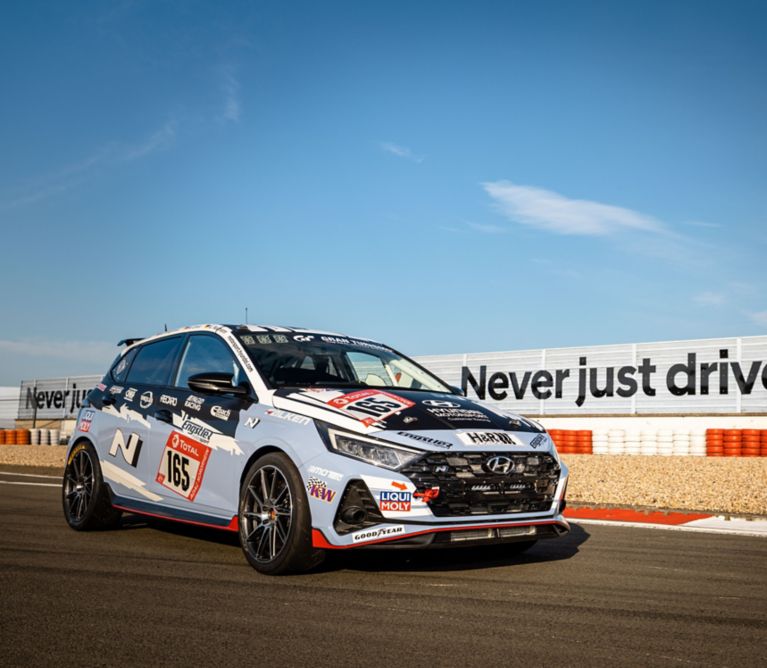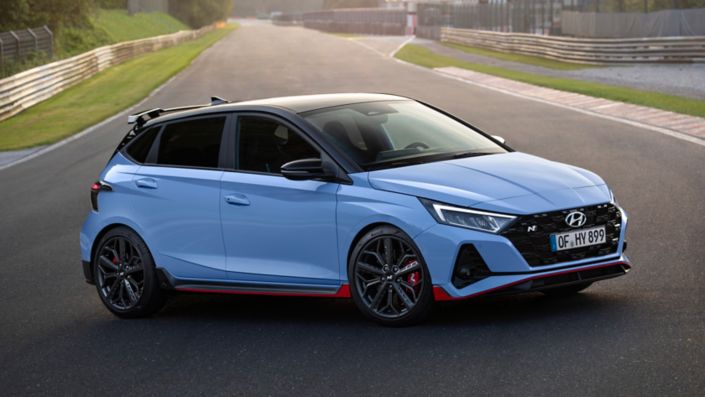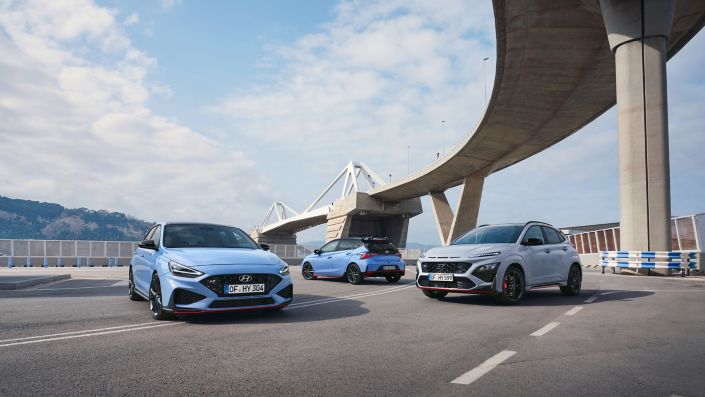- All-new i20 N debuted at 2021 Nürburgring 24 Hours race
- High-performance features make i20 N both a practical everyday car and a racetrack-ready hot hatch
- Learnings from Hyundai’s motorsport testing improved i20 N on road and racetrack
Press material
-
Download
-
Images
From 3-6 June, the all-new Hyundai i20 N participated at 2021 Nürburgring 24 Hours race. Following the i30 N, the i30 Fastback N, and Veloster N, it became the fourth Hyundai N model to compete in the most demanding endurance test of the world. The i20 N raced alongside the touring cars i30 N TCR and Elantra N TCR.
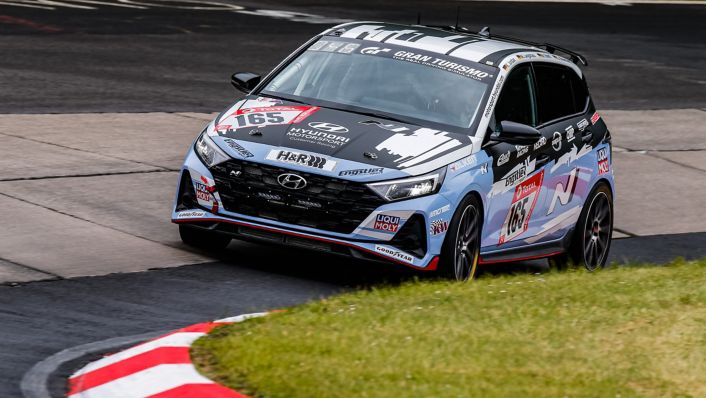
Fuel consumption combined for the Hyundai i20 N 1.6 TGDI (204 PS) with 6MT in l/100 km: 6.9; CO2 emissions combined in g/km: 158 (WLTP)
In its Nürburgring 24 Hours debut, the i20 N finished a solid 97th overall. The drivers – Marc Ehret, Kai Jordan, Markus Lungstrass, and Guido Naumann – showed the strong performance and reliability of Hyundai’s road-going designs, despite needing a stop for repairs on Saturday.
Before its debut, two prototypes of the i20 N had already completed their durability testing in Europe without any major issues. In 2019, the prototype stage car of the i20 N completed 481 laps around the Nordschleife in both wet and dry conditions. This accelerated durability test simulated up to 10,000 kilometres of driving at 90 to 95 per cent of its maximum performance within just five to six weeks.
From 2020 to 2021, the pilot stage car of the i20 N simulated the average lifetime use by a European customer, driving over 100,000 kilometres of public roads in hot and cold country tests in Spain and Sweden, respectively. This was in addition to more than 1,000 kilometres on the Nordschleife.
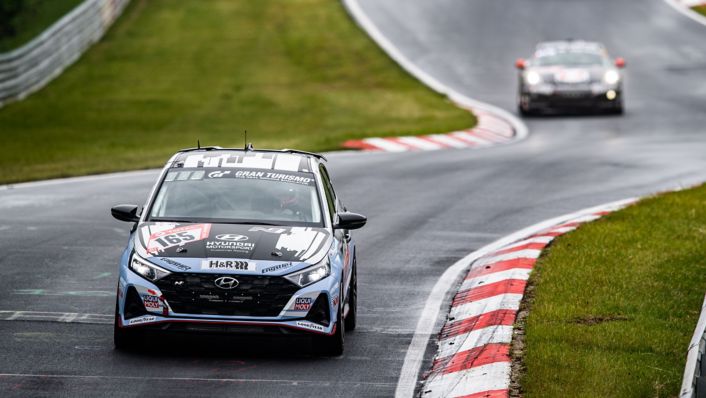
Fuel consumption combined for the Hyundai i20 N 1.6 TGDI (204 PS) with 6MT in l/100 km: 6.9; CO2 emissions combined in g/km: 158 (WLTP)
Inspiring the i20 N race car
The all-new i20 N went on to give rise to the i20 N race car competing at Nürburgring 24 Hours. This modified version of the i20 N sports a completely new look yet shares the same baseline with its road-going counterpart. The actual differences between the race car and the road model are minimal, demonstrating just how much performance the i20 N can deliver.
The foundation of any performance car, especially one determined to win at Nürburgring 24 Hours on the Nordschleife, is a powerful engine. The race car and the road-going i20 N are outfitted with the same 1.6-litre T-GDI turbo flat-power engine. However, while the i20 N’s engine delivers 204 PS of power and 275 Nm of maximum torque, the race car’s engine delivers 220 PS. This increase in horsepower positively influences the car’s acceleration and maximum speed. Both cars also feature a six-speed manual transmission.
The already strong and drivable architecture of the road-going i20 N ensured that nothing had to be retuned for the Nordschleife. Both cars are equipped with a custom made rear spoiler for improved aerodynamics in all conditions and large air intakes for the turbo engine and brake cooling. On top of that, both front grilles inherit the unmistakable chequered flag design with the N logo.
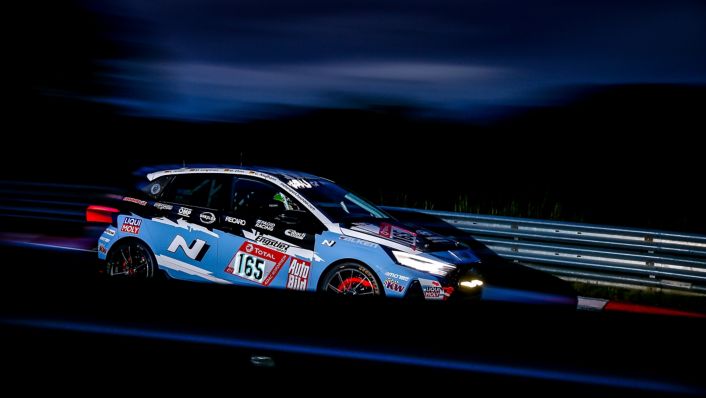
Fuel consumption combined for the Hyundai i20 N 1.6 TGDI (204 PS) with 6MT in l/100 km: 6.9; CO2 emissions combined in g/km: 158 (WLTP)
The race car and the road car also share the same high-performance driving features. Rev Matching guarantees minimal disruption to the cars balance when shifting, improves durability, and allows faster shifting. The N Corner Carving Differential, a Mechanical Limited Slip Differential (m-LSD), ensures great driveability and provides for a unique cornering experience.
Additionally, both cars are fitted with Launch Control, which maximises traction and minimises wheel spin, even though this was not necessary for the race due to the flying start at Nürburgring 24 Hours.
The interior is where the two cars differ most. The race car had to be weight-optimised to deliver top performance: a lightweight safety cage was installed and the passenger seat was removed. On the rear seat bench a 100-litre capacity tank was placed to cope with the race distance of Nordschleife. In the road-going i20 N, passengers can enjoy extra-supportive N sports seats with an integrated headrest. The sporty N steering wheel with grippy drilled leather and easily reachable controls, as well as the N‑branded gear knob, was borrowed from the road car as well.
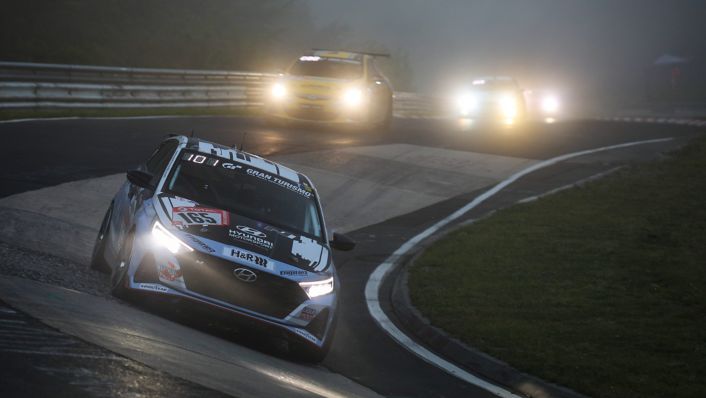
Fuel consumption combined for the Hyundai i20 N 1.6 TGDI (204 PS) with 6MT in l/100 km: 6.9; CO2 emissions combined in g/km: 158 (WLTP)
The Nürburgring race car shares even more high-performance features with i20 N
Hyundai developed its high-performance, fun-to-drive N models to get its customers’ hearts pounding whenever they’re seated behind the wheel. Fitted with the N Grin Control System, the i20 N offers distinct drive modes to customise the driving experience by optimising the parameters of the engine, ESC, exhaust sound, and steering for various driving conditions.
To stabilise the i20 N during impressive cornering manoeuvres, the Electronic Stability Control (ESC) system offers three stages for even sportier driving fun. The Column-mounted Motor Driven Power Steering system (C-MDPS) stabilises the all-new i20 N at high speeds and makes it instantly responsive at lower speeds. The fine-tuned C-MDPS and a low steering ratio of 12.0 – compared to the i20’s 15.0 steering ratio – allow the i20 N to deliver direct and precise steering for sportier driving.
Its debut and successful completion of the endurance run at this year’s 49th edition of the legendary “Eifel marathon” prove that the i20 N is a racetrack-ready hot hatch. On the other hand, it is also a practical vehicle for everyday driving. Whether cruising on the road or speeding on the racetrack, the all-new i20 N always promises to deliver the thrill of driving.
Technology transfer between road and track cars
Just like the rest of the Hyundai N model line-up – which includes the i30 N, the i30 Fastback N, and the all-new KONA N – i20 N was also inspired by motorsport. When testing and fine-tuning the high-performance driving technologies, the knowledge and techniques achieved during these developmental phases are later passed onto N models and vice versa. This shared expertise enhances the driving experience for Hyundai’s customers.
The successful i20 Coupe World Rally Car ended up directly inspiring the all-new i20 N and its race car counterpart. The two-way approach to technology transfer – from motorsport to the road-going model and back to a customized model just for Nürburgring – ensured that all editions of the i20 N would deliver top performance, demonstrate enhanced aerodynamics, and evoke the pleasure of driving.
Disclaimer: CO2 and emissions data
- Fuel consumption combined for the Hyundai i20 N 1.6 TGDI (204 PS) with 6MT in l/100 km: 6.9; CO2 emissions combined in g/km: 158 (WLTP)
- Fuel consumption combined for the Hyundai i30 N 2.0 T-GDI (250 PS) with 6MT in l/100 km: 7.7; CO2 emissions combined in g/km: 175 (WLTP)
- Fuel consumption combined for the Hyundai i30 N 2.0 T-GDI (280 PS) with 6MT in l/100 km: 8.0; CO2 emissions combined in g/km: 182 (WLTP)
- Fuel consumption combined for the Hyundai i30 N 2.0 T-GDI with N DCT in l/100 km: 8.4; CO2 emissions combined in g/km: 191 (WLTP)
- Fuel consumption combined for the Hyundai i30 Fastback N 2.0 T-GDI (250 PS) with 6MT in l/100 km: 7.7; CO2 emissions combined in g/km: 175 (WLTP)
- Fuel consumption combined for the Hyundai i30 Fastback N 2.0 T-GDI (280 PS) with 6MT in l/100 km: 8.0; CO2 emissions combined in g/km: 182 (WLTP)
- Fuel consumption combined for the Hyundai i30 Fastback N 2.0 T-GDI with N DCT in l/100 km: 8.4; CO2 emissions combined in g/km: 191 (WLTP)
- KONA N: This model may not yet be available for sale in your country. Fuel consumption and CO2 values for this model have not yet been determined.
- VELOSTER N: This model may not be available for sale in your country and has not been homologated (type approved) under the applicable European legislation. Fuel consumption and CO2 values for this model have not been determined.
- Fuel consumption combined for the Hyundai i20 1.2 MPi (84 PS) with 5MT in l/100 km: 5.7‑5.4; CO2 emissions combined in g/km: 129-124 (WLTP)
- Fuel consumption combined for the Hyundai i20 1.0 T-GDI (100 PS) with 6MT in l/100 km: 5.5-5.1; CO2 emissions combined in g/km: 127-117 (WLTP)
- Fuel consumption combined for the Hyundai i20 1.0 T-GDI (100 PS) with 7DCT in l/100 km: 5.8-5.3; CO2 emissions combined in g/km: 131-120 (WLTP)
- Fuel consumption combined for the Hyundai i20 1.0 T-GDI 48V (100 PS) with 6iMT in l/100 km: 5.4-4.9; CO2 emissions combined in g/km: 123-113 (WLTP)
- Fuel consumption combined for the Hyundai i20 1.0 T-GDI 48V (100 PS) with 7DCT in l/100 km: 5.6-5.1; CO2 emissions combined in g/km: 128-115 (WLTP)
- Fuel consumption combined for the Hyundai i20 1.0 T-GDI 48V (120 PS) with 6iMT in l/100 km: 5.4-5.0; CO2 emissions combined in g/km: 124-115 (WLTP)
- Fuel consumption combined for the Hyundai i20 1.0 T-GDI 48V (120 PS) with 7DCT in l/100 km: 5.4-5.1; CO2 emissions combined in g/km: 124-116 (WLTP)
- Fuel consumption combined for the Hyundai i20 Kappa 1.4 with 6MT in l/100 km: 6.5-6.2; CO2 emissions combined in g/km: 148-142 (WLTP)
- Fuel consumption combined for the Hyundai i20 Kappa 1.4 with 6AT in l/100 km: 7.1-6.5; CO2 emissions combined in g/km: 162-147 (WLTP)

